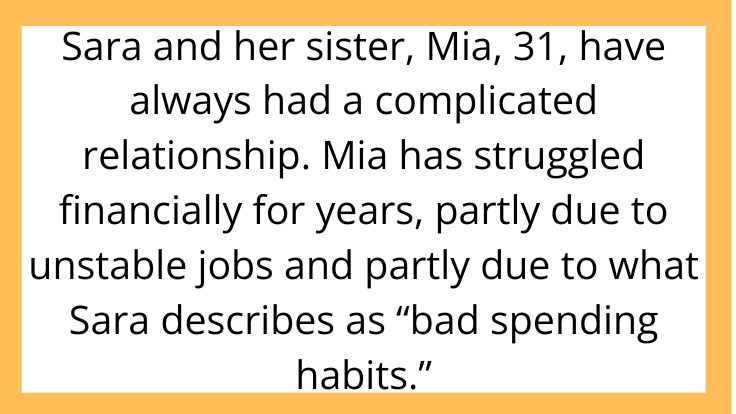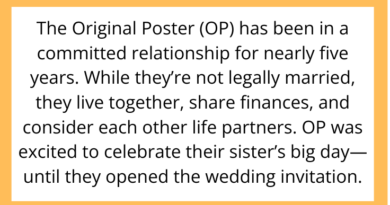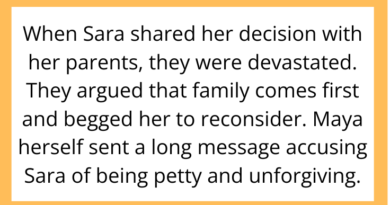AITAH for Telling My Sister She’s Not Entitled to My Inheritance Money?
When it comes to family and finances, emotions run high—and sometimes, relationships can be pushed to the breaking point. In this AITAH scenario, we’ll unpack a real-life inspired situation where one person’s decision to protect their inheritance money has sparked outrage and accusations of selfishness.
Let’s dive into the details.
The Situation: A Sudden Windfall and Rising Tensions

A 34-year-old woman—let’s call her Sara—lost her grandmother last year. Her grandmother left her a substantial inheritance: enough to pay off her mortgage, clear student debt, and create a comfortable emergency fund.
Sara and her sister, Mia, 31, have always had a complicated relationship. Mia has struggled financially for years, partly due to unstable jobs and partly due to what Sara describes as “bad spending habits.”
Shortly after Sara received her inheritance, Mia called her with a request: Could Sara share the money to help Mia pay off her credit card debt and move into a nicer apartment?
Sara refused.
Mia was furious, accusing Sara of being greedy and heartless. Their parents called to say Sara should “do the right thing” because “family comes first.”
Sara stood her ground, but the guilt was overwhelming. She turned to the AITAH community for judgment: Was she the villain for not sharing her inheritance?
The Arguments: Selfishness or Self-Preservation?

Sara’s Perspective: Financial Independence
Sara explained in her post that she had spent her entire adult life paying off loans and scraping by. Her grandmother specifically left her the inheritance to help her achieve financial stability.
“This was meant for me,” Sara wrote. “I finally have breathing room for the first time in years.”
Sara felt Mia’s debt wasn’t her responsibility—especially when Mia’s lifestyle choices were part of the problem.
Mia’s Perspective: Family Obligation
Mia’s argument centered around fairness.
“You have more than you need,” Mia allegedly told Sara. “Why wouldn’t you help your own sister?”
To Mia, Sara’s refusal was a betrayal. She felt that family members should support each other without keeping score.
Reddit’s Verdict: Not the Villain

The AITAH community overwhelmingly sided with Sara.
“You are under no obligation to give away your inheritance,” wrote one top commenter. “Mia’s financial problems are not your fault.”
Others pointed out that once you give money to someone with a pattern of overspending, it rarely ends there.
“If you hand over thousands now, she’ll expect it again later,” another commenter warned.
Why This Story Resonates

Inheritance and Entitlement
Money can change family dynamics overnight. Even if someone never expressed interest before, a sudden windfall can trigger feelings of entitlement.
This story is a classic example: Mia believed Sara owed her a share simply because they were sisters, regardless of the grandmother’s intentions.
Boundaries and Resentment
Setting financial boundaries can feel cruel, but it often prevents deeper resentment in the long run. If Sara had given in, she might have felt used—or worse, ended up in debt herself.
This situation shows that sometimes, protecting your own well-being is the most responsible choice.
How to Handle Family Financial Requests

If you ever find yourself in Sara’s shoes, here are a few tips:
-
Be Clear: Calmly explain your reasons for saying no. You don’t owe a detailed breakdown, but clarity helps.
-
Offer Alternatives: If you want to help, consider smaller gestures—a one-time payment or budgeting advice.
-
Hold Your Ground: Once you set a boundary, stick to it.
-
Avoid Guilt Trips: Emotional manipulation doesn’t make you the villain—it says more about the person applying the pressure.
The Takeaway: Saying No Isn’t Always Selfish

It’s easy to label someone as greedy when they refuse to share money. But context matters.
Sara wasn’t refusing out of spite—she was honoring her grandmother’s wish for her to have security. She was protecting herself from repeating the same financial instability she fought so hard to overcome.
You’re not the villain for choosing peace and stability over someone else’s demands.



